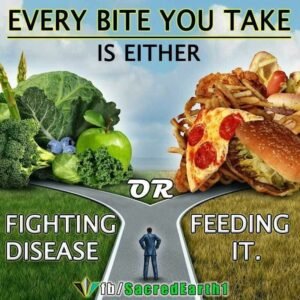Food Choices: Are You Fighting Disease or feeding it?

Food choices play a crucial role in human health. However, many people make poor choices when it comes to what they eat. Poor dietary choices can lead to several chronic diseases, including heart disease, diabetes, and cancer. In this blog, I will explore the relationship between food choices and disease and argue that we need to be more conscious about what we eat if we want to stay healthy.
Firstly, heart disease is one of the leading causes of death worldwide, and diet plays a significant role in its development. Several studies show that consuming a diet high in saturated and trans fats, sugar, and salt contributes to heart disease. Conversely, a diet rich in fruits, vegetables, whole grains, and lean protein has been shown to help prevent heart disease.
Secondly, diabetes is another chronic disease that is strongly linked to one’s food choices. The consumption of high-calorie, high-sugar, and high-fat foods can result in insulin resistance, a significant factor in the development of type 2 diabetes. According to the World Health Organization (WHO), a healthy diet should consist of a variety of fruits, vegetables, legumes, whole grains, and lean proteins while limiting sugar, salt, and fat intake.
Thirdly, another disease related to poor dietary choices is cancer. Several studies suggest that a diet rich in fruits and vegetables can help prevent cancer. Additionally, consuming processed and charred meats, saturated and trans fats, and sugar is frequently associated with an increased risk of cancer.
Fourthly, while some people believe that they can eat whatever they want as long as they exercise regularly, research indicates that this is not the case. Exercise does not counteract the negative effects of poor dietary choices. It is essential to remember that 80% of weight loss success is linked to one’s diet, not exercise.
Fifthly, food choices can also affect one’s mental health. Studies show that consuming a healthy diet can reduce the risk of developing depression and anxiety. Conversely, a diet high in sugar, unhealthy fats, and processed foods may increase one’s risk of developing mental health disorders.
Sixthly, a healthy diet is necessary for optimal brain function. It is crucial to fuel the brain with healthy fats and whole grains to improve cognitive function, memory, and attention span. This is especially important for college students, who need to study and retain information effectively.
Seventhly, eating a balanced diet can improve overall health and longevity. Research suggests that people who consume healthy diets live longer, healthier lives than those who consume unhealthy diets. The Harvard School of Public Health recommends consuming a variety of fruits and vegetables, whole grains, healthy fats, and lean proteins to achieve optimal health.
Eighthly, food choices can help prevent nutrient deficiencies. Consuming a variety of nutrient-dense foods, such as leafy greens, whole grains, and lean proteins, can help ensure that the body gets the vitamins, minerals, and nutrients it needs to function correctly.
Ninthly, food choices can also affect the environment. The production and consumption of meat, for example, contribute significantly to greenhouse gas emissions, global warming, and deforestation. Choosing plant-based foods over meat can help reduce environmental damage.
Lastly, it is essential to remember that food choices are personal and can vary depending on one’s individual needs and preferences. However, it is crucial to make informed decisions when it comes to food. Consulting with a healthcare provider or licensed dietitian and reading nutritional information can help individuals make better food choices.
In conclusion, food choices play an essential role in human health. A diet rich in fruits, vegetables, whole grains, and lean proteins can help prevent chronic diseases such as heart disease, diabetes, and cancer. Making informed choices about what we eat is critical if we want to stay healthy and prevent diseases. It is time to start asking ourselves: Are we fighting disease or feeding it? The answer lies in our food choices.

Comments